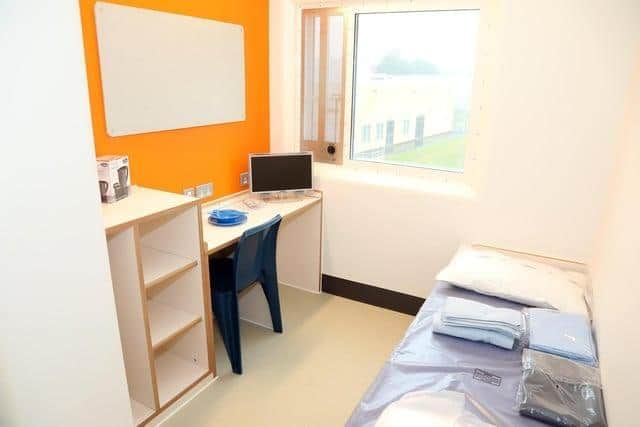HMP Five Wells inspection teams find self-harm, drug use, staffing issues, inadequate education classes and bad food at £253m Wellingborough prison
and live on Freeview channel 276
Inspection teams who made an unannounced visit to HMP Five Wells have found drug use, staff churn, inadequate education classes and bad food at the £253m Wellingborough prison.
Inspectors from different bodies looked at all aspects of prison life including health and social care from the Care Quality Commission (CQC), pharmaceuticals and education (Ofsted).
Advertisement
Hide AdAdvertisement
Hide AdOver a 10-day period inspectors found that outcomes for prisoners were ‘not sufficiently good’ for safety, ‘not sufficiently good’ for respect, and ‘poor’ for purposeful activity.


One positive aspect of the resettlement G4S-run prison was the preparation for release for those nearing the end of their sentences graded ‘reasonably good’ .
In the report Charlie Taylor, HM Chief Inspector of Prisons, reflected on the upheaval and turmoil of the prison’s first two years and said: “Opening a new prison is one of the toughest challenges in prison management and a first inspection is an important milestone in the life of an institution. It would be unrealistic to expect that all would be perfect, and our inspection notes the very real difficulties leaders have faced. At the time of the inspection, there was early evidence of a growing confidence and a better grasp of priorities.
“Stronger governance, oversight and supervision, the building of staff confidence and capability, and a more active and purposeful regime should now be the focus.”
Priority concerns identified:


1. Weak governance
Advertisement
Hide AdAdvertisement
Hide Ad2. Self-harm incidents being ‘very high’ with ‘not enough’ being done to reduce them
3. Staff did not always enforce standards of good behaviour among prisoners
4. The prison had a limited understanding of the needs of many of its prisoners, especially those with protected characteristics


5. Actions to resolve and mitigate identified risks to the health service had been ‘too slow’
Advertisement
Hide AdAdvertisement
Hide Ad6. Leaders had failed to provide sufficient full-time activity or ensure high quality education and vocational training
A further nine areas of concern were highlighted including lack of meaningful and regular support prisoners involved in anti-social behaviour, the availability of illegal drugs and segregation unit prisoners felt they did not feel cared for.
Hampered by an ‘instability of leadership’ – the prison’s third director since opening was appointed in May 2023 – inspectors noted ‘problems with staff attrition, concerns over staff confidence and capability, as well as general weaknesses in the quality of governance and oversight’. This had culminated in several ‘improvement notices’ and a ‘rectification notice’ concerning the delays in building up the population to full capacity being issued.
Advertisement
Hide AdAdvertisement
Hide AdThe report says that ‘new stability’ had seen improvements in staff sickness absences and retention but the number of prison custody officers (PCOs) resigning each month remained high.
Almost 750 PCOs had been recruited since the prison opened but only 272 remained in post – nearly two-thirds had left the prison. Several staff members had been arrested or dismissed for their involvement with ‘inappropriate or alleged illegal activity’.
Inspectors criticised the prison’s design that failed to provide a purpose-built gym, a mandatory drug testing suite, adequate office space and ‘physical security’ to prevent the ingress of illegal drugs.
The inspectors said that even though leaders had made ‘considerable efforts’ to reduce illegal drug supply and G4S (the contractor) had funded additional support, including a dedicated search team and perimeter patrol dogs, but this was not complimented by a greater focus on reducing demand.
Advertisement
Hide AdAdvertisement
Hide AdMr Taylor said: “Leaders were working hard to improve both procedural and physical security arrangements, which included the addition of new resources which we understood went beyond the requirements of the contract.
"Drugs, however, remained a huge problem, with random testing suggesting about a third of all prisoners were active users. Similarly, the rate of self-harm in the prison was high, although the rate was falling and no individual had taken their own life. Arrangements to support those in crisis and tackle self-harm still needed to be more robust.”
In a parallel inspection by Ofsted, the education contract held by Weston College was graded ‘inadequate’ in all areas – the lowest grade possible. The report said there was still a high number of staff vacancies and many vocational training workshops and classrooms remained empty. Mr Taylor agreed that the quality of education, skills and work was also ‘not good enough’.
Other findings were:
– New arrivals being ‘treated well’
– Falling incidents of violence
– Staff feeling safer and more confident
– Use of force and segregation were both comparatively low
Advertisement
Hide AdAdvertisement
Hide Ad– Inexperienced staff not confident in their supervisory responsibilities allowed ‘too much potentially corrosive, low-level poor behaviour to go unchallenged’
– Prisoners, ‘with some justification’, were critical of the food
– Work to promote fairness and equality had been neglected and needed greater prioritisation
– Many prisoners only employed part-time with about 18 per cent with no role at all.
Advertisement
Hide AdAdvertisement
Hide AdThe report has drawn criticism from Nacro, a charity that works closely with ex-offenders’ rehabilitation and social re-integration.
Nacro chief executive, Campbell Robb, said: “Disappointingly even HMP Five Wells, one of the latest flagship, modern prisons is rife with the same problems we are seeing across the rest of the prison estate.
“Time and time again, prison inspection reports keep showing high levels of self-harm, a lack of meaningful activity for people in prison and prisoners isolated and locked up for too long. This report today shows that simply building new prisons, and increasing prison places does not address the underlining issues with the whole system.”
Inspectors found three examples of ‘notable positive practice’
Advertisement
Hide AdAdvertisement
Hide Ad– The family interventions residential unit offered good support to prisoners to build and maintain family ties
– Staff from DWP completed benefit claims for prisoners before release so that payments were available without delay
– The departure lounge was a bright and welcoming facility that offered very good practical support to prisoners
An HMP Five Wells spokesperson said: “The report acknowledges the challenges faced when opening a new prison. We have put in place an action plan that addresses all HMIP's key priorities with a focus on recruitment, retention, addressing the ingress of drugs, governance and oversight.
Advertisement
Hide AdAdvertisement
Hide Ad“We are pleased the report highlights examples of good practice, including the support we provide to prisoners during their early days in custody and on family days. Inspectors said rates of violence and self-harm are falling and this downward trajectory has continued since the inspection.“We are committed to developing a stronger and broader purposeful activity, skills and education programme to enhance employment opportunities for prisoners.”
For the full inspection report go to https://www.justiceinspectorates.gov.uk/hmiprisons/wp-content/uploads/sites/4/2024/04/Five-Wells-web-2024-1.pdf
HMP Five Wells fact file:
Prisoners held at the time of inspection: 1,650
Baseline certified normal capacity: 1,680
In-use certified normal capacity: 1,650
Operational capacity: 1,687
Population of the prison
• 64 prisoners released into the community each month
• 24 foreign national prisoners
• 28 per cent of prisoners from black and minority ethnic backgrounds
• Average 64 releases a month during 2023
• 160 prisoners receiving psychosocial support for substance use
• 108 prisoners receiving opioid substitution therapy
• An average of 117 mental health referrals a month over the last six months
• £2.60 budget for three meals a day for each prisoner
Comment Guidelines
National World encourages reader discussion on our stories. User feedback, insights and back-and-forth exchanges add a rich layer of context to reporting. Please review our Community Guidelines before commenting.
